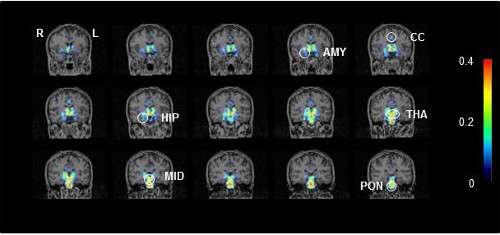Toward a clearer diagnosis of chronic fatigue syndrome

Researchers at the RIKEN Center for Life Science Technologies, in collaboration with Osaka City University and Kansai University of Welfare Sciences, have used functional PET imaging to show that levels of neuroinflammation, or inflammation of the nervous system, are higher in patients with chronic fatigue syndrome than in healthy people.
Chronic fatigue syndrome, which is also known as myalgic encephalomyelitis, is a debilitating condition characterized by chronic, profound, and disabling fatigue. Unfortunately, the causes are not well understood.
Neuroinflammation - the inflammation of nerve cells - has been hypothesized to be a cause of the condition, but no clear evidence has been put forth to support this idea. Now, in this clinically important study, published in The Journal of Nuclear Medicine, the researchers found that indeed the levels of neuroinflammation markers are elevated in CFS/ME patients compared to the healthy controls.
The researchers performed PET scanning on nine people diagnosed with CFS/ME and ten healthy people, and asked them to complete a questionnaire describing their levels of fatigue, cognitive impairment, pain, and depression. For the PET scan they used a protein that is expressed by microglia and astrocyte cells, which are known to be active in neuroinflammation.
The researchers found that neuroinflammation is higher in CFS/ME patients than in healthy people. They also found that inflammation in certain areas of the brain - the cingulate cortex, hippocampus, amygdala, thalamus, midbrain, and pons - was elevated in a way that correlated with the symptoms, so that for instance, patients who reported impaired cognition tended to demonstrate neuroinflammation in the amygdala, which is known to be involved in cognition. This provides clear evidence of the association between neuroinflammation and the symptoms experienced by patients with CFS/ME.
Though the study was a small one, confirmation of the concept that PET scanning could be used as an objective test for CFS/ME could lead to better diagnosis and ultimately to the development of new therapies to provide relief to the many people around the world afflicted by this condition.
Dr. Yasuyoshi Watanabe, who led the study at RIKEN, stated, "We plan to continue research following this exciting discovery in order to develop objective tests for CFS/ME and ultimately ways to cure and prevent this debilitating disease."
More information: Yasuhito Nakatomi, Kei Mizuno, Akira Ishii, Yasuhiro Wada, Masaaki Tanaka, Shusaku Tazawa, Kayo Onoe, Sanae Fukuda, Joji Kawabe, Kazuhiro Takahashi, Yosky Kataoka, Susumu Shiomi, Kouzi Yamaguti, Masaaki Inaba, Hirohiko Kuratsune, Yasuyoshi Watanabe, "Neuroinflammation in patients with chronic fatigue syndrome/myalgic encephalomyelitis: a 11C-(R)-PK11195 positron emission tomography study", The Journal of Nuclear Medicine, vol.55, No.6, 2014, DOI: 10.2967/jnumed.113.131045

















